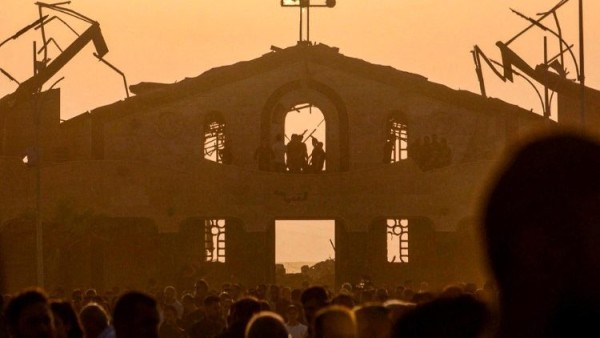
Mourners at the funeral of victims of a fire in the mainly Christian city of Qaraqosh in Iraq (AFP or licensors)
Ishtartv.com – vaticannews.va
By Joseph Tulloch, 23 January 2024
Patriarch Louis Raphaël Sako, the head of Iraq’s Chaldean Catholic
Church, is leading his country’s Christians in a three-day fast for peace in
Iraq, the Holy Land, and the wider world.
The fast, held every year in the run-up to Lent, is known by Syriac Christians—ancient
communities concentrated in the Middle East—as the Baotha d'Ninwaye or
“Petition of the Ninevites.”
Prayers for "reconciliation and fraternal relations"
This year, most Syriac Christians are observing the fast on
22-24 January.
Patriarch Sako, whose Chaldean Church is one of the larger Syriac
Churches, is calling on the faithful to offer the fast up to God “for peace and
stability in Iraq, the Holy Land, Ukraine, and the world.”
The Patriarch – whom Pope Francis created cardinal in 2018 – called on
believers to “fervently pray to God Almighty to inspire world leaders to seek
peace and not war... and to achieve fruitful progress towards reconciliation,
fraternal relations, love, and tolerance for the good of humanity.”
The "Petition of the Ninevites"
The Nineveh Fast is held every year to mark the three days that the
prophet Jonah spent in the belly of a whale. It’s also a commemoration of the
fasting in the city of Nineveh after its inhabitants accepted Jonah’s call to
repentance.
Many Syriac Christians abstain from all food and drink from midnight to
noon on each of the three days. Others avoid meat or animal products for the
entirety of the period, or do not eat at all.
Syriac Christian communities, which draw from theological and liturgical
traditions in the Syriac language rather than in Latin or Greek, date back to
the earliest days of Christianity.
Devastated by war and instability, they maintain a tenuous foothold in
the Middle East. There are also large communities in south-western India and in
the diaspora.
Syriac is a dialect of Aramaic, the language of Jesus, which was once
spoken across the region.
|